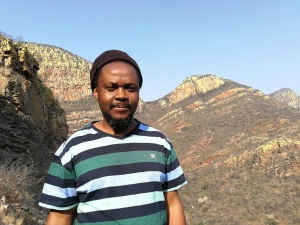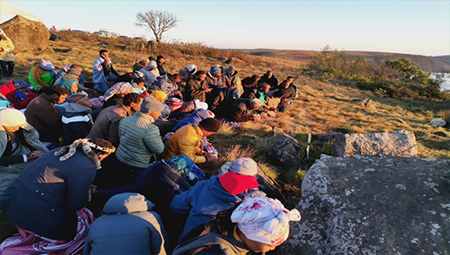African indigenous astronomy (bolepa dinaledi in Setswana) is one discipline of competencies of the broader African indigenous knowledge systems negated by the modern education system, including modern astronomers, researchers and policy makers.
This is according to Dr Motheo Koitsiwe, indigenous astronomer researcher and director of the North-West University’s (NWU’s) Indigenous Knowledge Systems (IKS) Centre.
He says historians of science agree that astronomy is the first science in the world.
“In addition, scientists and archaeologists also agree that Africa is the cradle of human kind and civilisation, therefore it makes sense that disciplines such as astronomy, cosmology, mathematics, chemistry – among others – also can be traced back to Africa,” says Dr Koitsiwe.
As part of the African Calendar, the NWU IKS Centre celebrated the African New Year on 23 September 2021 at Inzalo Ye Langa (birthplace of the sun) in Mpumalanga.
Dr Koitsiwe, IKS lecturer, PhD candidate Otsile Maditsi, and IKS students and ambassadors Kgothatso Mafiri, Boikanyo Kgakgamatso and Caroline Kgosiemang, represented the IKS Centre at the event.
Dr Koitsiwe says, according to the book Kemet* / African Royal Calendar by Mkhulu Nsingisa (CEO of the Zindzi Mandela Foundation and the Great Empire of Kemet Movement), ancestral prayers indicate that African indigenous cultures in South Africa and the African continent affirm September as the month of the new beginnings.
“This is demonstrated by the way the months in the African calendar are named. Among the Khoi, September is called Tara or Khumu, in Sesotho it’s called Loetse, and Setswana it’s known as Lwetse. In Tshivenda this is the period of Khubvumedzi, while in Tsonga it is known as Ndzhati, and in Xhosa it is called EyoMsintsi. In siSwati it is Inyoni, in isiZulu it is referred to as Umandulo, and among the Amandebele, it is known as uKhukhulamungu.
“Therefore it is clear that September is not only about the annual celebration of our diverse heritage in South Africa,” adds Dr Koitsiwe.
He adds that it is very important to integrate indigenous astronomy in the education curriculum, and to teach the African child that September is marked as the beginning of the New Year among various African indigenous communities.
“The African calendar is in alignment with nature and due to the indoctrination of the Western education system, we are more accustomed to the Gregorian calendar, which is completely out of alignment with nature and based on Western philosophy, astronomy, cosmology, worldview and epistemology,” says Dr Koitsiwe.
*Kemet means black and refers to the land of the people.

Dr Motheo Koitsiwe.

These African Traditional Health Practitioners are doing a ritual ceremony as part of the celebration of the African New Year on the morning of 23 September 2021 at Inzalo Ye Langa (Picture by Dr Koitsiwe).
